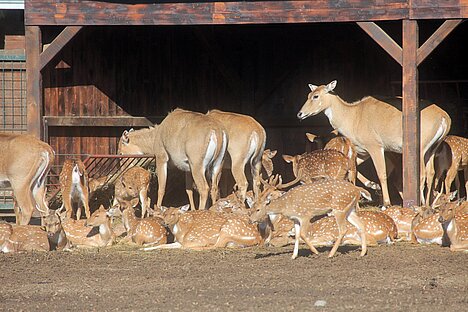Roe deer liver

Venison is a popular chew for dogs that offers many benefits. But what is deer liver and how often can you feed it to your four-legged friend? In this article, you'll find out everything you need to know about deer liver for dogs.
What is venison liver?
Venison liver is the liver of deer, a wild animal found in many parts of Europe. The liver is an important organ that is responsible for detoxifying the body, among other things. The liver also stores the carbohydrate glycogen, which regulates blood sugar levels and body temperature.
Venison is a natural product that contains no artificial additives such as colorants, attractants or preservatives. It has an aromatic, mild taste and is low in cholesterol and calories. Venison can be fed fresh, roasted or dried.
What are the benefits of venison for dogs?
Venison is a healthy and tasty chew for dogs that has many benefits:
- Venison liver is rich in nutrients such as sodium, potassium, iron, cholesterol and various vitamins, especially vitamin A. Vitamin A is important for your dog's eyesight, growth, skin and mucous membranes.
- Venison is hypoallergenic (anti-allergic) and is therefore particularly suitable for dogs that suffer from food allergies. Venison can be a good alternative to other types of meat that often trigger allergies.
- Venison is easy to digest and has a mild laxative effect. This can be helpful for dogs with digestive problems.
- Venison is a natural tooth cleaner that strengthens the chewing muscles and prevents tartar.
What are the disadvantages of venison for dogs?
Venison also has some disadvantages that you should be aware of:
- Venison has a high content of vitamin A, iron and copper. Although these substances are important for your dog, they can be harmful in excessive quantities. Too much vitamin A can put a strain on the liver and lead to bone changes. Too much iron and copper can lead to poisoning.
- Venison tends to soften the feces and can cause diarrhea. This can be problematic for dogs with a sensitive gastrointestinal tract.
- Venison can contain parasites or bacteria that can make your dog ill. This is especially true of raw or insufficiently chilled liver. You should therefore always pay attention to the quality and hygiene of the liver.
How often can you feed venison to dogs?
Venison liver should only be used as a supplement to normal food and not as the main food. You shouldn't give your dog deer liver more than once or twice a week. The amount depends on the size and weight of your dog. As a rule of thumb: no more than 5 grams of liver per kilogram of body weight per day.
If you feed your dog deer liver, you should make sure that he drinks enough water. You should also always wash the liver well or fry it briefly to kill any germs. Dried liver is safer to feed as it has usually already been hygienically treated.
Venison liver is a healthy and tasty chew for dogs that offers many benefits. It is rich in nutrients, hypoallergenic, easy to digest and cleans teeth. However, it also has some disadvantages that you should be aware of. It is high in vitamin A, iron and copper, which can be harmful in excessive amounts. It tends to soften the stool and may contain parasites or bacteria. You should therefore only give your dog fawn liver once or twice a week and always pay attention to the quality and hygiene of the liver.
If you notice any signs of hypersensitivity or poisoning in your dog, you should see your vet immediately. We are not a substitute for a vet, but we try to be as accurate as possible. Every dog reacts differently and we recommend you get a second opinion or consult your vet if in doubt.
Stay healthy and take good care of your four-legged friend!😊